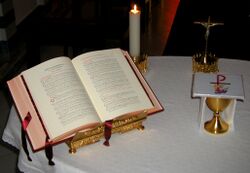Roman Missal
(religious text) | |
|---|---|
 | |
| The liturgical book that contains the texts for mass in the Catholic Church. |
The Roman Missal (Latin: Missale Romanum) is the liturgical book that contains the texts and rubrics for the celebration of the Mass in the Roman Rite of the Catholic Church.
In 1223 Saint Francis of Assisi instructed his friars to adopt the form that was in use at the Papal Court (Rule, chapter 3). They adapted this missal further to the needs of their largely itinerant apostolate. Pope Gregory IX considered, but did not put into effect, the idea of extending this missal, as revised by the Franciscans, to the whole Western Church; and in 1277 Pope Nicholas III ordered it to be accepted in all churches in the city of Rome. Its use spread throughout Europe, especially after the invention of the printing press; but the editors introduced variations of their own choosing, some of them substantial. Printing also favoured the spread of other liturgical texts of less certain orthodoxy. The Council of Trent determined that an end must be put to the resulting disparities.
Implementing the decision of the Council of Trent, Pope Pius V promulgated, in the Apostolic Constitution Quo primum of 14 July 1570, an edition of the Roman Missal that was to be in obligatory use throughout the Latin Church except where there was another liturgical rite that could be proven to have been in use for at least two centuries.
In 1965 and 1967 some changes were officially introduced into the Mass of the Roman Rite in the wake of Sacrosanctum Concilium, but no new edition of the Roman Missal had been produced to incorporate them. They were reflected in the provisional vernacular translations produced in various countries when the language of the people began to be used in addition to Latin. References sometimes met in an English-language context to "the 1965 Missal" concern these temporary vernacular productions, not the Roman Missal itself. Some countries that had the same language used different translations and varied in the amount of vernacular admitted.